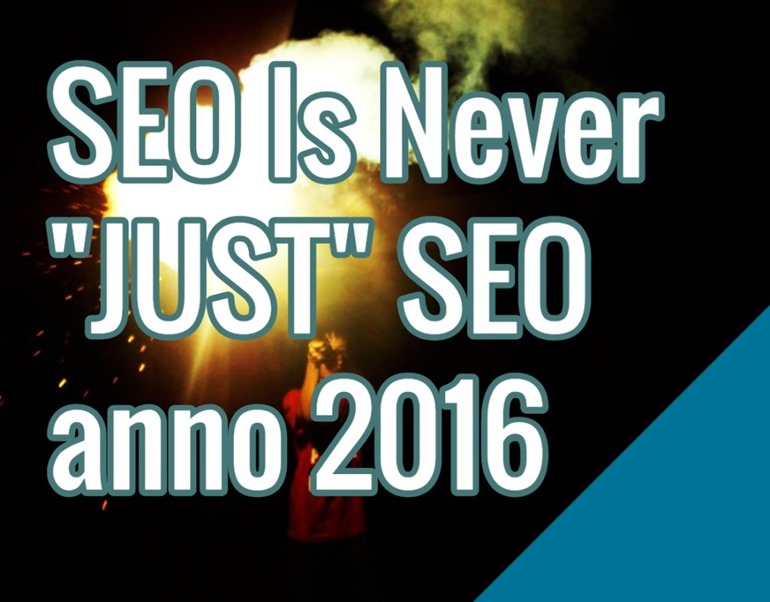One of the most common disconnections between SEO agencies and clients is the inability to understand how organic search has evolved into a multi-faceted channel that encompasses everything from Social Media and User-generated content to link earning and content development.
For whatever reason, the definition of SEO seems to be ingrained in the minds of marketing executives and business owners as a singular medium that only considers keywords and meta data.
This mindset is dangerous to businesses and brands because it creates the idea that you need input from multiple disciplines to be able to execute a successful online campaign, forcing companies to pay multiple vendors to perform services that could/should be managed by one entity.
The reason for this is because SEO serves as the platform that allows you to build and develop a comprehensive strategy.
SEO Encompasses Most Digital Concepts
If you think that SEO is only about keywords, search volume, and Meta data…Think again.
The following list represents each individual component of the modern SEO field:
- Analytics
- Technical optimization
- Consumer behavior research/insight
- Content development
- Site taxonomy
- User experience (I can already hear all of the UX strategists yelling at me)
- Onsite optimization
- Link earning/building
- Online reputation management
- Conversion optimization
- Inbound marketing/demand generation
With this list, it’s easy to see why it’s unnecessary to work with multiple agencies or departments when looking for solutions dedicated to organic, content, and technical management.
Why UX Is Limited In Value
The amount of confusion that exists between User Experience and SEO is largely due to the fact that UX is a tangible object, while SEO is believed to be conceptual.
The infamous thought that SEO “can just wave a magic wand” to obtain visibility and conversions has limited opportunity for companies that struggle with maximizing the value of their intended conversion funnels.
From experience, most UX strategists believe that conversions are completely based on user flow and the ability to provide an aesthetically pleasing online experience.
The issue is that the nature of UX is not designed to consider:
- Algorithm standards set by each major search engine
- Organic search intent
- Consumer motivation
- Semantic search principles
- Competitive authority
- Database optimization
- Product organization
What Happens If You Only Consider UX
I have witnessed too many internal and third-party vendor meetings where the UX agency or strategist will stand their ground on subjects that directly affect and influence organic visibility.
Their arguments are largely centered on how:
- Word count doesn’t matter when it comes to increasing an online brand’s authority.
- Ecommerce sites that utilize filters do not need to attach to a singular landing page.
- URL structures don’t support search efficiency and therefore, do not need to include proper breadcrumbs.
The issue with these views is not just that they are fundamentally incorrect, but that:
- Word count has been proven to influence everything from visibility and authority to user engagement and transactions.
- Filters without correct management can create an excessive amount of duplicate content.
- URL structures that do not contain proper breadcrumbs cause search crawlers to pull content from competitive sites.
So when it comes to user experience vs. SEO, I always say that you can’t have a great user experience if Google doesn’t want to connect your website to online users.
If you only build out landing pages that are attractive in their appearance, you are ignoring everything Google has requested when it comes to offering an all-encompassing experience that aligns with and satisfies consumer intent.
Why Content Is Not Actually King
We have all heard how Google and other search engines “love” fresh content. I’m sure most of you have even been told that if you publish content on a regular basis, you will be able to increase your rankings, authority, and monthly traffic.
Although this is true to a degree, creating content that’s not guided by SEO is extremely limited in its ability to produce the type of results you have heard about and are looking for.
If you look at the various content development firms that exist throughout the country, those that are successful like Skywords and Wordstream take the time to:
- Research the online motivations behind their target audiences.
- Create unique content that is complimented with sufficient depth of information and details.
- Properly embed internal and external links in strategic locations within an article or landing page.
- Map their subjects to seasonal and other offline variables that drive online consumer interest.
Are successful at:
- Attracting qualified traffic to their clients’ sites.
- Getting their content to rank within the first few positions on search listings.
- Increasing monthly qualified conversions for their clients.
What Happens If You Only Create Content For The Sake of It
There are plenty of businesses and brands that have been burned by content development firms that claim they know all about SEO, but operate based on a model that sees one content strategist fulfill impossible daily quotas.
This urgency and demand forces the writer to essentially copy and paste as much information as possible, leaving their work unoriginal and duplicated. When duplicate content is added to a website at length, Google and other search engines begin to find their experiences are not meaningful, informative, or relevant and therefore, they shouldn’t be indexed at the top of organic listings.
You can try to cheat the system or believe that word count doesn’t matter but at the end of the day, the only things you’ll have are your convictions, not results.
Why Your Analytics Team Is Wasting Your Budget
Regardless of what type of analytics platform your company uses (e.g. Google Analytics, BrightEdge, SEMRush) it is the responsibility of the SEO strategist who is managing a particular campaign to be able to report on their efforts and results.
Every credible SEO strategist should be certified in analytics and Adwords, while also being able to report on various dimensions and metrics that speak to online growth.
Without being able to work within these types of platforms, an SEO strategist cannot properly determine what to do as a next step in their campaign, based on their inability to understand:
- How offline variables affect online search behavior.
- Which landing pages are attracting qualified traffic, which ones are not and why.
- What type of user engagement is associated with each category of content.
- How mobile and tablet users are interacting with the intended brand/website.
- How all organic efforts are influencing monthly and annual conversions.
- How specific events, call-to-actions, and conversion points are functioning.
Since SEOs are responsible for constantly reviewing and interpreting these considerations and are also able to implement conversion, event, and goal tracking…Why would you insert some type of middle man in front of the SEO strategist that is developing your campaign?
What Happens When Analytics is Separated From SEO
In my experience, agencies that work with third-party analytics vendors and brands that have separated their SEO and analytics teams:
- Are limited in their ability to make effective decisions since the analytical data is owned by someone else.
- Compete for external value and self-preservation, making teams view and treat each other as competition.
- Do not properly build out long-term strategies since analytic specialists are not usually trained in SEO.
Why Social Media and PPC Extensions Are Necessary
Modern SEO does need the support of social media and pay per click in order to amplify results, catalyze brand awareness, and drive immediate conversions.
The responsibilities that go into these two specific mediums are completely outside of SEO and both comprise of efforts that may overlap, but cannot be managed by one individual.
Building out an Adwords campaign is completely different than scheduling a social engagement calendar. While both parties need SEO to understand what specific keyterms they should include in their copy or bid for, they do not utilize the same tools, resources, and processes.
While there may be cases I am overlooking that demand a UX or analytics team that is different than their marketing department, I have yet to see a case in the nine years I have worked in this industry where this environment was conducive for positive results.
Hand-Picked Related Articles:
- 7 New SEO Opportunities In 2016
- How To Get Back Into SEO After Being Away
- 40 Online Marketing Strategies Experts Recommend for 2016
* Adapted lead image: ![]()
![]() Some rights reserved by paolosdala
Some rights reserved by paolosdala
SEO Is Never “JUST” SEO anno 2016
The post SEO Is Never “JUST” SEO anno 2016 appeared first on Search Engine People Blog.
Search Engine People Blog(66)







